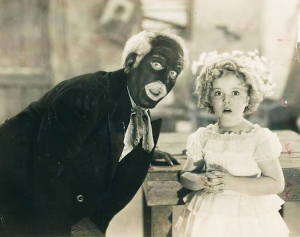Shirley Temple grew up developing her career during the most racist era of Hollywood
In the 1930’s, Hollywood was a completely different animal. The plots of early films had good intentions and set the standards for the box-office hits that we see today. However, there were several films that reflected the thoughts of naïve America and projected stereotypes that have been since stricken down by society.
The passing of former child star Shirley Temple brings back memories of an ignorant Hollywood, when “colored” actors were given the token role of janitor or butler. It was a time when women were represented as sexual items, used to sell films.
Temple starred in at least 26 films before her 18th birthday and had taken the world by storm with her adorable personality. But in that time, no one understood the roots of how these films came to be. Not only was Temple overworked and started off underpaid, but the directors of her movies fused in racist connotations that society takes as abominations in film today.
Temple starred in a movie called The Little Rebel. The Fox film may be about a little girl in the Civil War-era, yet the only African-American actors star as slaves who fear the Union soldiers upon being released.
The movie Dimples was one of the best received films of it’s time yet it still causes outrage today. Although it starts off as an innocent film about a young street entertainer that is given a new luxurious home, the stereotypical roles for the only African-Americans in the film and the “black-faced” white actors portraying African-American workers seem to over-power the plot of the film with pure ignorance.
Temple herself was never accused of racism. She was only the rookie in Hollywood’s game plan that pushed the ignorance through films that created a platform for future feature films. Years later, Temple would fizzle out of the limelight and into politics. She was selected by President Richard Nixon as the first female United States representative to the 24th General Assembly of the United Nations.
In today’s age of filmmaking, the old ways of creating classic feature films have grown obsolete. Though favoritism and preference still reigns over Hollywood, we no longer give women strictly the stereotypical “damsel in distress” or the mother figure roles. Demi Moore shot down that barrier in G.I. Jane. People of all colors have equal opportunity at landing the lead role like Zoe Saldana in Colombiana. In a society that praises diversity, actors and actresses alike have been given multi-ethnic roles like Brad Pitt in “The Mexican” or Tom Cruise as “The Last Samaurai”.
African-American actors and actresses have dominated film and television with their own iconic films from comedies, tragedies and biopics. Latinos, Arab, Desi, Persian and Asians have made their way into the film industry in more ways than one by launching their own strain of films, television channels and so much more.
The film industry has moved on from its racist practices from the beginning of a classical era. We are in a society where all heavily seeks after diversity and people of any race and creed can achieve anything they put their mind to.
Tony Centeno (@_tonyMC)



